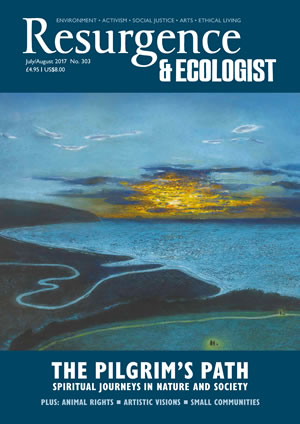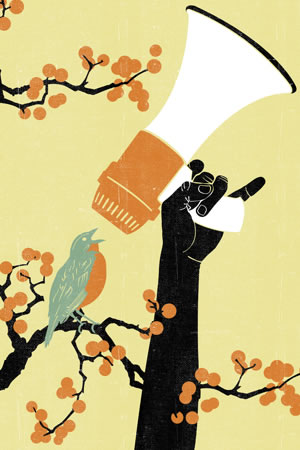Since we humans are an animal species, it is surely obvious that human rights are a form of animal rights and that animal rights include – or should include – the human species.
Sadly, not everyone sees it this way. Many people view humans and other animals as totally distinct, and draw a clear, sharp line between humans and other animal species and therefore between animal rights and human rights. That is not my view. Sentience is the bond that unites all animal species, human and non-human. I accept our shared animalism and advocate our shared claim to be spared suffering and accorded inalienable rights.
It is true that other animals are less intelligent than humans and lack our mental-physical skills and our capacity for culture and conscience. But this is no justification for abusing them, any more than we would sanction the abuse of humans – such as babies and people with mental disabilities – who lack these highly developed capacities. We acknowledge that we have a special responsibility to protect weaker, more vulnerable humans. Surely the same reasoning applies to other weaker, more vulnerable thinking, feeling creatures?
There is, in my moral universe, no great ethical difference between the abuse of human and non-human animals, or between our duty of compassion towards other humans and other animal species. Indeed, I see a link between the oppression of non-human animals and the oppression of human beings. There are common threads between the oppression of other animals and the oppression of humans because of their nationality, race, gender, faith or non-faith, political beliefs, disability, sexual orientation or gender identity.
The different forms of human and other animal oppression are interconnected, based on a similar abuse of power and a similar infliction of harm and suffering. They cannot be fully understood separately from one another. How we mistreat animals parallels how we mistreat people. Cruelty is barbarism, whether it is inflicted on humans or on other species.
The campaigns for animal rights and human rights share the same fundamental aim: a world without oppression and suffering, based on love, kindness and compassion. Speciesism, in contrast, is the belief and practice of human supremacism and the consequent abuse of other animal species. It involves prejudice, discrimination and violence in favour of human beings, and exploitation, incarceration, mistreatment or killing of other animals by humans.
This humans-first ideology of speciesism is analogous to homophobia, racism and misogyny. A form of domination and oppression, it is incompatible with a humane, civilised society. We humans are an animal species. We know about pain and suffering. So why do most people have such intolerant attitudes towards other animals and accept their abuse in medical laboratories, farms, zoos, circuses and sports events?
It does not follow that our highly sophisticated intelligence and material development give us the right to lord it over other species. Just because we have the capacity to do so, that does not mean that we should. On the contrary: our brainpower, education and conscience give us a special responsibility of stewardship over the Earth and all its beings.
My thinking has been influenced by the Australian philosopher Peter Singer and his groundbreaking book Animal Liberation. In my mind, it is one of the most important books of the last 100 years. It expands our moral horizons beyond our own species and is thereby a major evolution in ethics.
Over the course of human history, our notion of rights has progressively broadened. Initially, rights were confined to the immediate family, tribe and clan. Then they were widened to larger religious and political communities. Later, rights were expanded again to cover entire nations and, with the Universal Declaration of Human Rights in 1948, to protect the whole of humankind. The next logical step is to extend rights to other sentient beings.
The abuse of animals is rooted in a form of human chauvinism that views non-human sentient beings as ‘other’. This mindset allows us the ‘excuse’ to look down on and mistreat them, including insulting, exploiting, abusing, dominating or even killing those ‘other’ beings. We stop seeing them as living, thinking, feeling creatures. Species difference and inferiority become a rationale for the infliction of suffering.
Anti-animal prejudice runs deep. We even hear it in everyday conversation. Bigots often disparage other people with speciesist epithets. They accuse them of acting like a beast or behaving worse than an animal. This bigotry echoes the vile insults that black people are savages, women are bitches, and LGBT people are perverts.
Although it is a controversial and uncomfortable comparison, there are parallels between human and animal slavery. Both involve similar ownership of other beings, and their confinement and exploitation. The images of Africans tethered in slave ships are not that different from those of farm animals imprisoned in pens and cages. The instruments of restraint used on animals in medical laboratories echo those used on black slaves in the United States prior to the 20th century.
It is surely not an accident that some of the greatest anti-slavery campaigners – such as Frederick Douglass and Harriet Beecher Stowe – drew comparisons between animal and human slavery. And their opposition to animal enslavement is shared by modern African American heroes Dick Gregory and Alice Walker.
But before we can liberate the millions of oppressed humans and billions of exploited animals we need to free our minds and start thinking in a new way: to consciously eliminate the mentality of subjugation and entitlement that allows us to passively acquiesce with or, even worse, actively participate in the cycle of abuse against other sentient beings – human and non-human.
Animal liberation is in the same ethical tradition as women’s, black, lesbian, gay, bisexual and transgender liberation. It is about ending the suffering that flows from a supremacist mindset and power relations of domination. Surely, in the 21st century, the time has come to emancipate non-human animals, just like we previously emancipated humans through abolishing slavery, male-only suffrage and anti-LGBT laws?
Animal liberation is a moral duty. Just because other animal species look different from us and have a lesser intellect, that is no justification to harm them for our own self-gratification. After all, many vertebrates aren’t really that different from us humans. They share much of our DNA and our capacity for thought, feelings, emotions, memory, sociability, language, altruism, empathy and, very importantly, pleasure and pain.
We need to recognise and embrace our animal nature and identity. If we did that, the excuses and rationalisations for treating other species badly would fall away. We’d realise that it’s time for both human and other animal liberation.








